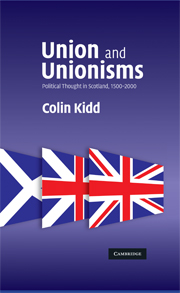Book contents
- Frontmatter
- Contents
- Preface
- 1 Introduction: the problems of Unionism and banal unionism
- 2 Unionisms before Union, 1500–1707
- 3 Analytic unionism and the issue of sovereignty
- 4 Narratives of belonging: the history and ethnology of organic union
- 5 From assimilationist jurisprudence to legal nationalism
- 6 The two kingdoms and the ecclesiology of Union
- 7 Early nationalism as a form of unionism
- 8 Conclusion
- Index
- References
1 - Introduction: the problems of Unionism and banal unionism
Published online by Cambridge University Press: 06 July 2010
- Frontmatter
- Contents
- Preface
- 1 Introduction: the problems of Unionism and banal unionism
- 2 Unionisms before Union, 1500–1707
- 3 Analytic unionism and the issue of sovereignty
- 4 Narratives of belonging: the history and ethnology of organic union
- 5 From assimilationist jurisprudence to legal nationalism
- 6 The two kingdoms and the ecclesiology of Union
- 7 Early nationalism as a form of unionism
- 8 Conclusion
- Index
- References
Summary
Does Scottish unionist political thought merit serious historical analysis? Is there, in fact, a body of unionist political thought worthy of the name? Certainly, the topic has not generated much enthusiasm in the field of Scottish studies. While not all Scottish historians or literary scholars are partisan nationalists, Scottish history and Scottish literature as subjects nurture a non-doctrinaire nationalist outlook by way of their understandable emphases on the distinctiveness of Scotland and Scottish historical and cultural trends from wider developments in the rest of Britain. Unsurprisingly, Scottish academics have paid vastly greater attention to nationalism than to unionism, out of all proportion to the former's representativeness of public opinion. It would be hard to gauge the overwhelming dominance of unionism in Scottish political culture between the 1750s and the 1970s if one read widely in Scottish historiography, even harder if one immersed oneself in Scottish literary studies. The perceived stolidity of unionist values would appear to hold less attraction for academics than the romantic stirrings of nationalism, however faint the electoral ripples. While a few books have examined the political phenomenon of Scottish unionism, there has been no study of the ideas which underpinned it. An assumption appears to prevail among Scottish academics that unionism is dull and monochrome, and its political thought unlikely to exhibit much in the way of originality or sophistication – an intellectual dead end.
Information
- Type
- Chapter
- Information
- Union and UnionismsPolitical Thought in Scotland, 1500–2000, pp. 1 - 38Publisher: Cambridge University PressPrint publication year: 2008
